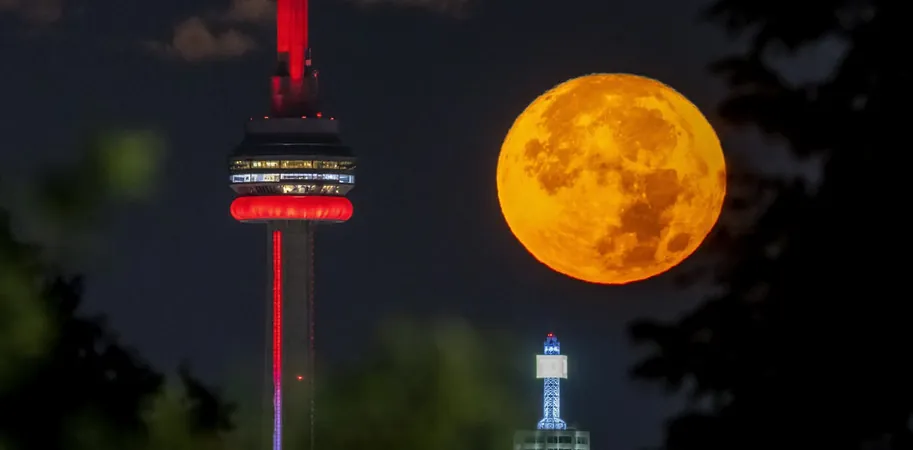
Canada's Pioneering Moon Rover Awaits a Name Before Embarking on an Extraordinary Lunar Adventure
2024-11-20
Author: Olivia
Exciting news emerged today from the Canadian Space Agency, as they unveiled a competition dedicated to naming Canada's inaugural rover set to explore the moon. This unmanned mission will venture into the challenging south polar region of the moon in pursuit of water ice and to investigate its distinct geological features.
Leading this historic mission is a distinguished professor and planetary geologist who also plays a key role in the Artemis III mission—marking the first manned return to the moon since 1972.
A Historic Milestone for Canada
The mission is especially significant as it represents not just Canada's first lunar rover but also the nation's first-ever leadership role in a mission to another celestial body. Historically, while Canadian technology has contributed to lunar and Martian explorations, it has always been under the direction of other countries. This endeavor marks a pivotal moment for Canada's robust space community, reflecting the growing capabilities of the nation.
The rover's development is a collaborative effort, with support from seven Canadian firms responsible for building components and instruments for the mission. A team of scientists from six Canadian universities, along with colleagues from the U.S. and U.K., are all invested in this groundbreaking venture. Additionally, one of the rover's scientific instruments is being supplied by the Johns Hopkins University Applied Physics Laboratory, with backing from NASA, who will also provide the launch vehicle.
The Quest for a Name
The anticipation builds as Canada looks for the perfect name to symbolize this mission. While satellites often receive functional names, rovers have historically been labeled with inspiring titles that evoke a sense of exploration. NASA’s rovers, like Sojourner, Spirit, Opportunity, Curiosity, and the latest, Perseverance, ignite passion for science and technology.
In a nod to this tradition, the Canadian Space Agency has proposed four potential names for the rover, each reflecting Canadian values and the mission’s spirit:
1. **Athabasca** - Inspired by a historical river, embodying exploration and discovery. 2. **Courage** - A testament to the bold ventures leading to this mission. 3. **Glacier** - Recognizing both Canada's polar ties and the mission’s goal of uncovering lunar water ice. 4. **Pol-R** - A clever pun indicating both the mission's polar focus and Canadian identity.
Canadians can vote for their favorite name until December 20, 2024.
A Challenging Mission Ahead
As Canadians ponder the rover's name, the team is diligently refining the rover’s design. Recently, they achieved a crucial milestone known as the preliminary design review, confirming that their plans align with government requirements and assessing project risks, budgets, and timelines.
This lunar mission is not without its challenges, as it targets one of the moon's most unforgiving terrains: the South Pole. The rover must endure extreme cold, with nighttime temperatures plunging below -200°C for extended periods. Moreover, the small rover—comparable to a coffee table and weighing just 35 kilograms—must house multiple intricate scientific instruments.
During the International Astronautical Congress held in Milan, Italy, an update on the mission's scientific objectives was shared. The rover aims to:
- Analyze the unique geological structures of a region previously untouched by human and robotic exploration. - Locate water ice, a discovery that transforms our understanding of the moon's capacity to support future missions. - Evaluate the radiation environment, vital for preparing for human return missions to the lunar surface.
Canada's Growing Legacy in Space Exploration
Over the past twenty years, the Canadian Space Agency has been pivotal in developing various prototype planetary rovers. This experience lays a solid foundation for the new lunar rover. While the European Space Agency's ExoMars mission has experienced delays—previously slated for 2022—Canada's role as a key contributor demonstrates its growing influence in space exploration.
Looking ahead, Canada has even grander aspirations, as highlighted in the 2023 federal budget. Plans for a multipurpose lunar utility vehicle are underway, aimed at enhancing lunar operations, aiding in scientific inquiries, and supporting astronaut activities on the moon.
Stay tuned for further developments as Canada makes its mark on lunar exploration!









 Brasil (PT)
Brasil (PT)
 Canada (EN)
Canada (EN)
 Chile (ES)
Chile (ES)
 España (ES)
España (ES)
 France (FR)
France (FR)
 Hong Kong (EN)
Hong Kong (EN)
 Italia (IT)
Italia (IT)
 日本 (JA)
日本 (JA)
 Magyarország (HU)
Magyarország (HU)
 Norge (NO)
Norge (NO)
 Polska (PL)
Polska (PL)
 Schweiz (DE)
Schweiz (DE)
 Singapore (EN)
Singapore (EN)
 Sverige (SV)
Sverige (SV)
 Suomi (FI)
Suomi (FI)
 Türkiye (TR)
Türkiye (TR)